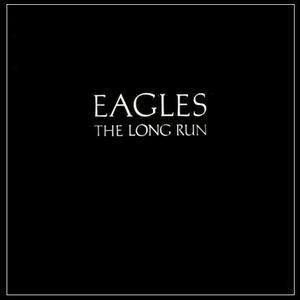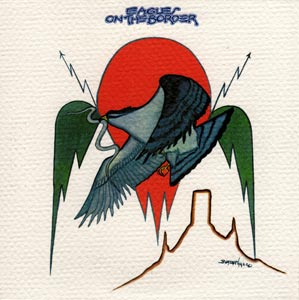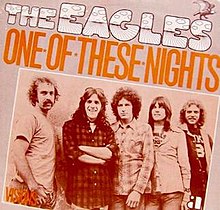
The Eagles are an American rock band formed in Los Angeles in 1971. With five number-one singles and six number-one albums, six Grammy Awards and five American Music Awards, the Eagles were one of the most successful musical acts of the 1970s in North America and are one of the world's best-selling bands, having sold more than 200 million records worldwide, including 100 million sold in the US alone. They were inducted into the Rock and Roll Hall of Fame in 1998 and were ranked number 75 on Rolling Stone's 2004 list of the "100 Greatest Artists of All Time". Founding members Glenn Frey, Don Henley, Bernie Leadon, and Randy Meisner were recruited by Linda Ronstadt as band members, some touring with her, and all playing on her third solo album, before venturing out on their own on David Geffen's new Asylum Records label.

The Long Run is the sixth studio album by American rock group the Eagles. It was released in 1979 by Asylum Records in the United States and the United Kingdom. This was the first Eagles album to feature Timothy B. Schmit, who had replaced founding member Randy Meisner, and the last full studio album to feature Don Felder before his termination from the band in 2001.

"Hotel California" is a song by American rock band the Eagles, released as the second single of their album of the same name on February 22, 1977. Songwriting credits go to Don Felder (music), Don Henley, and Glenn Frey (lyrics). The Eagles' original recording of the song features Henley singing lead vocals and concludes with an iconic 2 minute and 12 seconds long electric guitar solo performed by Felder with a Gibson Les Paul Gibson EDS-1275 double neck and Joe Walsh with a Fender Telecaster, in which they take turns of playing the lead before harmonizing and playing arpeggios together towards the fade-out.

Eagles is the debut studio album by American rock band the Eagles. The album was recorded at London's Olympic Studios with producer Glyn Johns and released on June 1, 1972. It was an immediate success for the then-new band, reaching No. 22 on the Billboard 200 and achieving a platinum certification from the Recording Industry Association of America (RIAA). Three singles were released from the album, each reaching the Top 40 of the Billboard Hot 100: "Take It Easy", "Witchy Woman", and "Peaceful Easy Feeling". The band, starting with this album, played a major role in popularizing the country rock sound.

On the Border is the third studio album by American rock band the Eagles, released on March 22, 1974. Apart from two songs produced by Glyn Johns, it was produced by Bill Szymczyk because the group wanted a more rock‑oriented sound instead of the country-rock feel of the first two albums. It is the first Eagles album to feature guitarist Don Felder. On the Border reached number 17 on the Billboard album chart and has sold two million copies.

One of These Nights is the fourth studio album by American rock band the Eagles, released on June 10, 1975. The album was the band's commercial breakthrough, transforming them into international superstars. In July that year, the record became the Eagles' first number one album on Billboard Top LPs & Tape chart, yielding three Top 10 singles: "One of These Nights", "Lyin' Eyes" and "Take It to the Limit". Its title song is the group's second number one single on the Billboard Hot 100. The album sold four million copies and received a Grammy nomination for Album of the Year. A single from the album, "Lyin' Eyes", was also nominated for Record of the Year, and won the Eagles' first Grammy for Best Pop Performance by a Duo or Group with Vocals at the 18th Annual Grammy Awards in 1976. The band embarked on the worldwide One of These Nights tour to promote the album.

Eagles Live is the first live album by the American rock band Eagles, a two-LP set released on November 7, 1980. Although the Eagles were already in the process of breaking up, the band owed Elektra/Asylum Records one more album and fulfilled that contractual obligation with a release of performances from the Hotel California and The Long Run tours.

Eagles Greatest Hits Volume 2 is the second compilation album by the Eagles. It features many of their biggest hits not on Their Greatest Hits (1971–1975), including "Hotel California", their signature song. The album was released in 1982, after the band's breakup. That same year, Don Henley and Glenn Frey both released their debut solo albums.

"I Can't Tell You Why" is a song by the American rock band Eagles that appeared on their 1979 album The Long Run. It was written by band members Timothy B. Schmit, Glenn Frey and Don Henley. Recorded in March 1978, it was the first song finished for the album and the first Eagles song to feature Schmit on lead vocals. Released as a single in February 1980, it became a Billboard top 10 hit in April, reaching number eight on the Billboard Hot 100 and number three on the Adult Contemporary chart. It was the group's last top ten hit on the Billboard Hot 100.

"Best of My Love" is a song written by Don Henley, Glenn Frey, and J. D. Souther. It was originally recorded by the Eagles, and included on their 1974 album On the Border. The song was released as the third single from the album, and it became the band's first Billboard Hot 100 number 1 single in March 1975. The song also topped the easy listening chart for one week a month earlier. Billboard ranked it as the number 12 song for 1975.

"New Kid in Town" is a song by the Eagles from their 1976 studio album Hotel California. It was written by Don Henley, Glenn Frey and J.D. Souther. Released as the first single from the album, the song reached number one in the U.S. and number 20 in the UK. The single version has an earlier fade-out than the album version. Frey sings the lead vocals, with Henley providing the main harmony vocals. Randy Meisner plays the guitarrón mexicano, Don Felder plays electric guitars, and Joe Walsh plays the electric piano and organ parts. The song won the Grammy Award for Best Vocal Arrangement for Two or More Voices.

"Heartache Tonight" is a song written by Don Henley, Glenn Frey, Bob Seger and J. D. Souther, recorded by the Eagles and features Glenn Frey on lead vocals. The track was included on their album The Long Run and released as a single in 1979. It reached No. 1 on the U.S. Billboard Hot 100 in November of that year and was certified Platinum by the Recording Industry Association of America representing one million copies sold. It was the Eagles' final chart-topping song on the Hot 100.

"Take It Easy" is the debut single by the American rock band Eagles, written by Jackson Browne and Eagles band member Glenn Frey, who also provides lead vocals. It was released on May 1, 1972, and peaked at No. 12 on the Billboard Hot 100 chart on July 22, 1972. It was also the opening track of the band's eponymous debut album and has become one of their signature songs, included on all of their live and compilation albums. It is listed as one of The Rock and Roll Hall of Fame's 500 Songs that Shaped Rock and Roll.

"Lyin' Eyes" is a song written by Don Henley and Glenn Frey and recorded in 1975 by the American rock band Eagles, with Frey singing lead vocals. It was the second single from their album One of These Nights, reaching No. 2 on the Billboard Hot 100 chart and No. 8 on the Billboard Country chart. It remained their only top 40 country hit until "How Long" in 2007–2008.

"James Dean" is a song written by Don Henley, Glenn Frey, Jackson Browne, and J. D. Souther, and recorded by the American rock band Eagles for their 1974 album On the Border. It was the second single released from this album, reaching number 77 on the U.S. pop singles chart.

"Take It to the Limit" is a song by the Eagles from their fourth album One of These Nights from which it was issued as the third single on November 15, 1975. It reached No. 4 on the U.S. Billboard Hot 100 and was also the Eagles' greatest success to that point in the UK, going to No. 12 on the charts. Billboard ranked it as the No. 25 song for 1976.

"Life in the Fast Lane" is a song written by Joe Walsh, Glenn Frey and Don Henley, and recorded by American rock band Eagles for the band's fifth studio album Hotel California (1976). It was the third single released from this album, and peaked at No. 11 on the Billboard Hot 100.

"Tequila Sunrise" is a song from 1973, written by Don Henley and Glenn Frey, and recorded by the Eagles. It was the first single from the band's second album, Desperado. It peaked at number 64 on the Billboard Hot 100.

"The Long Run" is a song written by Don Henley and Glenn Frey and recorded by the Eagles. The sound of the song is viewed as a tribute to the Stax / Memphis rhythm and blues sound. It was the title track of their album The Long Run and was released as a single in November 1979. It reached No. 8 on the U.S. Billboard Hot 100 in early 1980. It was the second of three singles released from The Long Run album, preceded by "Heartache Tonight," which reached No. 1 on the Billboard Hot 100 in November 1979, and followed by "I Can't Tell You Why," which also reached No. 8 on the Billboard Hot 100, in the spring of 1980.

"Already Gone" is a song recorded by the American rock band the Eagles for their 1974 album On the Border. It was written by Jack Tempchin and Robb Strandlund and produced by Bill Szymczyk.




















